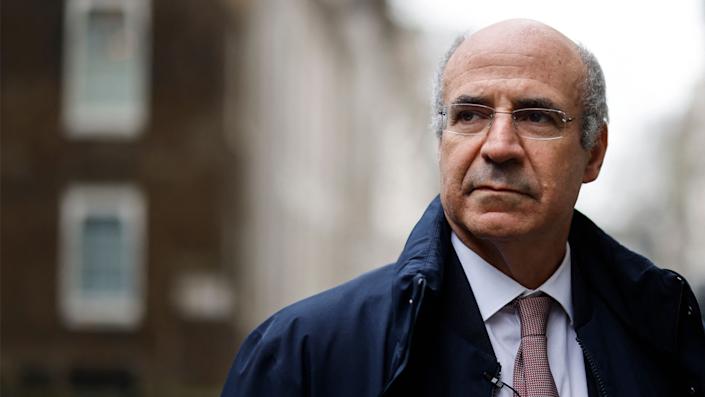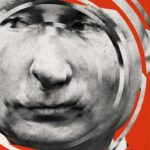NEW YORK — A trillion dollars: That’s how much money famed investor Bill Browder believes Vladimir Putin and Russian oligarchs have stolen from the Russian people since the fall of the Soviet Union.
“And that was money that was supposed to be spent on health care and education, roads and services,” Browder said at a Manhattan event to celebrate the publication of his second book, “Freezing Order,” which chronicles how he became a Putin nemesis as a result of his attempts to expose Kremlin corruption. Those efforts led to the death of Browder’s attorney Sergei Magnitsky, who was tortured in a Russian prison and whose name is affixed to sanctions bills passed by Congress.
Learning of Magnitsky’s death was “the most heartbreaking, traumatic, and devastating moment of my life,” Browder writes — and a sign of how committed Putin was willing to pursuing perceived enemies of the state. The grandson of American communist leader Earl Browder, Bill Browder had made billions through Hermitage Capital Management, the fund he started in 1996, during the chaotic period of full-contact Russian capitalism.
As Browder heightened scrutiny of some of the companies he invested in — most notably, energy giant Gazprom — he ran afoul of a Kremlin that, under Putin, has declared such questions off limits, as they would go to the very heart of the kleptocracy that had ruled Russia since the nation’s industry was sold off and plundered in the early 1990s.
“Everyone tries to think about Russia as a sovereign state and Putin as a leader acting in national interest,” Browder said to Yahoo News, describing that outlook as a fundamental misunderstanding. “You think you can apply political science to Russia. You need to apply criminal science. You need to be a criminologist to understand Russia. People don’t go into government to serve the country. They go into government to steal money.”
Browder was banned from entering Russia in 2005 and has since watched a series of American presidents try to improve relations with the Kremlin. He now lives in London, a city favored by the oligarchs he despises.
“We basically said, ‘It’s OK. We want your money. We want your oil,’” Browder told Yahoo News in an interview at the Century Club ahead of Tuesday’s book release party.
Today it is uncontroversial to call Putin a war criminal. But the man bombing Kharkiv is the same one who leveled the Chechen capital, Grozny, in 2000, invaded Georgia in 2008 and seized Ukrainian territory for the first time in 2014. “When I walked into the offices of government ministers in Europe, or the United States, back in the early days talking about sanctioning Russia — it’s like I walked in with a giant turd on my head,” Browder said.
Today, Browder is known less as an investor than as a human rights campaigner and Putin critic. Tuesday’s party thus included an eclectic mix: the professional basketball player Enes Kanter Freedom, former federal prosecutor Preet Bharara, private equity giant Stephen Schwarzman and National Review journalist Jay Nordlinger, who in 2017 highlighted the refusal of federal authorities to allow Browder into the U.S. The decision was reversed.
Browder is especially withering when it comes to the Western attorneys, bankers and publicists who help Putin’s oligarchs hide their ill-gotten gains, sue investigative journalists into submission and burnish their blood-spattered records with favorable coverage.
There could be only one motive for Western firms to do business with the Kremlin, Browder believes. “They’re just a bunch of greedy bastards that are trying to make as much money as possible,” he said, alluding to the legal travails of British journalist Catherine Belton, who was sued for reporting on Kremlin corruption. “They don’t care who they’re working for.”
Last week, Browder testified in Washington during a hearing on the Enablers Act, which would tighten already existing rules around money laundering, in effect providing more government scrutiny into the secretive movement of funds from countries like China and Russia.
“If we make banks report dirty money but allow law, real estate and accounting firms to look the other way, that creates a loophole that crooks and kleptocrats can sail a yacht through,” Rep. Tom Malinowski, D-N.J., said last fall when introducing the legislation. While it targets any institution or individual abetting money laundering, the measure has assumed a new urgency since Russia invaded Ukraine in February.
Browder has additionally called for foreign accomplices of Russia to be deprived of entry into the United States, a proposal clearly aimed at Kremlin allies residing in the British capital, which has earned the unflattering nickname “Londongrad.” He bemoans the notion that high-profile seizures of oligarchs’ yachts give the impression of fatal blows, when they are really just minor difficulties or men worth billions.
“The real money is held in highly complex trusts and structures,” Browder said, in offshore havens like Jersey and the Cayman Islands.
Sanctions are one way to fight Putin. Weapons are another. “The Ukrainians say they need a no fly-zone,” he pointed out, rejecting the idea that such a move would immediately lead to nuclear war. “At what point,” he wondered, “do you finally stand up to Russia?”
And much as he would like to see Putin defeated, he hopes to return to Russia one day when it is a free country, one that doesn’t threaten him with prison or murder.
“It’s fascinating. It’s interesting. It’s unforgettable. It’s horrible,” Browder told Yahoo News. “It’s nasty, brutish. It’s got everything. If Putin wasn’t in power, and there was a democratic government, I would love to go back there.”




